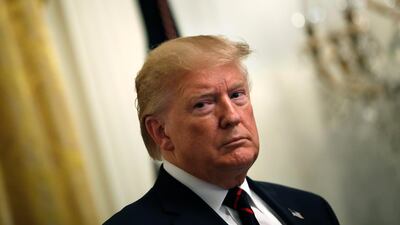The Democrats in the House of Representatives last week opened a formal impeachment inquiry into US President Donald Trump for abuse of power. He is alleged to have used his office to pressure the Ukrainian president to look into a politically-motivated investigation of his main Democrat rival for the 2020 presidential election, Joe Biden, and his son, Hunter. Launching an impeachment inquiry is a high-stakes gamble with an uncertain outcome that will have consequences for global financial markets.
What is impeachment and how does it work?
Any member of the House can introduce an impeachment resolution, which is sent to a committee for review. The process can be started without a resolution, as is the case with the current impeachment inquiry. The committee reviews the evidence, or carries out an investigation and sends articles of impeachment, or charges, to the full House, if it finds strong evidence.
The House can pass the articles with a simple majority vote, "impeaching" the president. The process then moves to the Senate, where the chief justice of the Supreme Court oversees a trial. The 100-member Senate then votes on the charges, with a two-thirds majority needed to convict and remove the president. If the president is impeached, the vice president takes over the White House.
Why does it matter to financial markets?
The impeachment process will take months to unfold. In the meantime, uncertainty could destabilise markets. An outcome either way would have consequences for US-Iran politics, which is directly linked to global crude supplies and oil price moves. It will also affect the ongoing trade war with China, and the potential dispute being lined up with the European Union, both of which are threats to global growth.
The pressure of a potential impeachment could lead Mr Trump to strike a mini-deal in order to suspend tariffs planned for introduction in October and December that Bank of Singapore economists say could negatively impact the US economy.
What could happen to equities markets?
A knee-jerk reaction to sell stocks on news of impeachment news made sense but a subsequent rebound is more telling. Investors should expect short bouts of market volatility but longer-term ambivalence. The Senate seems unlikely to wave through impeachment, Jasper Lawler, head of research at London Capital Group, says in his latest research note. However, significant uncertainties cloud the market outlook arising from trade tensions, slowing global growth and rising recession risks, Bank of Singapore economists note.
How is the US dollar expected to react?
The dollar has been a beneficiary so far. The initial flow into the dollar was seen as a flight to safety rather than an acknowledgement of higher political uncertainty. “We see impeachment as putting more upward pressure on the dollar beyond haven effects,” Mr Law says. “If impeachment were to happen, there would likely be a more conventional presidential attitude for a strong dollar policy,” he adds.
How have gold traders responded to impeachment?
Interestingly, gold has fallen since the impeachment proceedings were announced, with investors preferring the dollar as a hedge. A rally in gold prices this year has been attributed not as a desire for safe haven assets but as protection from currency devaluation as central banks continue to cut rates.
“As such we think overall impeachment is neutral for gold,” Mr Law noted.


